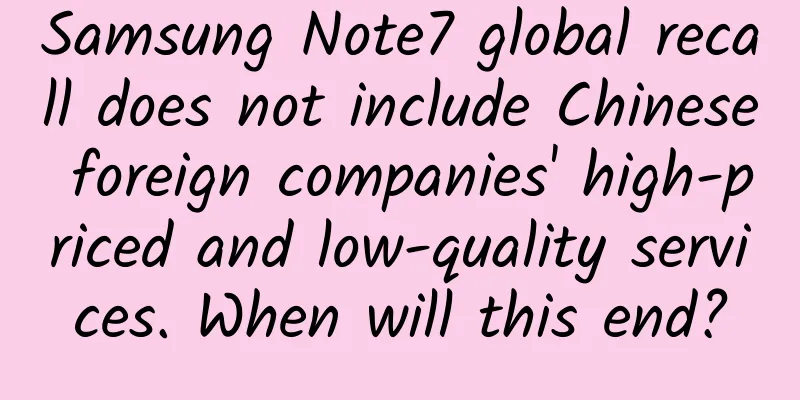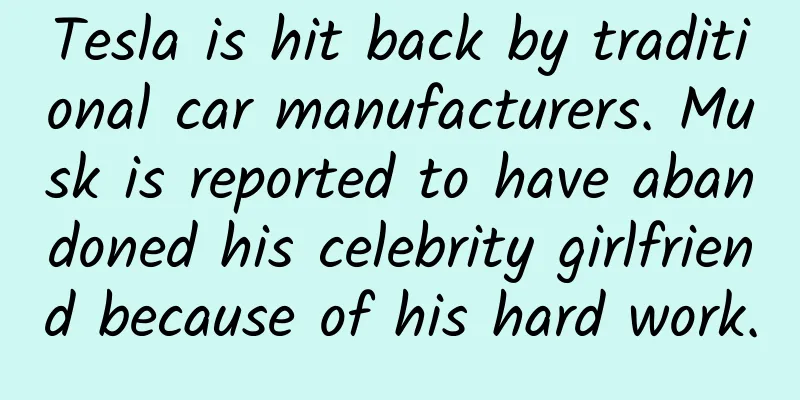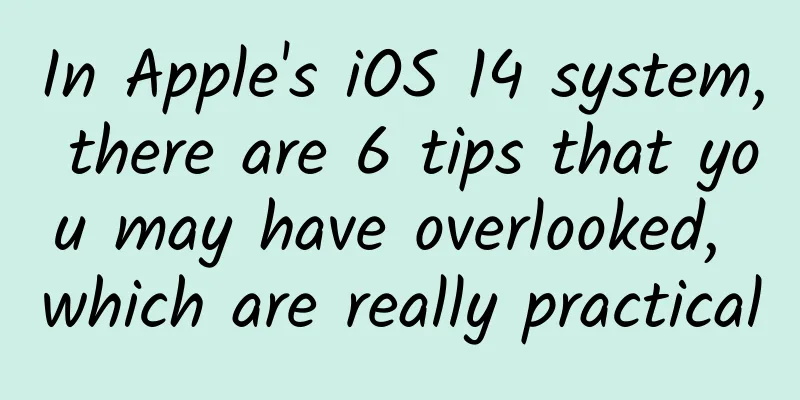Samsung Note7 global recall does not include Chinese foreign companies' high-priced and low-quality services. When will this end?

|
Recently, Samsung's flagship model this year, the large-screen flagship Note7, broke out explosive news, that is, this model can explode on the spot due to battery defects. So far, nearly 40 Note7 phones have been used as explosives. Fortunately, no casualties were caused, but some property losses were caused. The negative impact on the Samsung brand is probably even greater. After the incident, Apple urgently increased the order of iPhone7, making up for it. Samsung then apologized and said it would actively compensate, and also announced a global recall of Note7 products. Such a large-scale recall involving 2.5 million mobile phones is rare, and the economic losses are expected to reach a huge amount of US$1 billion. I feel sorry for Samsung for five seconds. However, regarding the recall issue that domestic users are most concerned about, Samsung stated that China is not within the scope of the mobile phone recall because the batteries of the Note7 mobile phones shipped to China are different from those in other regions. Therefore, the Samsung Note7 mobile phone has been launched in the domestic market as scheduled and has not been affected by the explosion incident. There is no recall plan. Are domestic users using “specially supplied machines”? According to Samsung, Samsung has provided domestic users with a "special model" of Samsung Note7 with better quality, which is produced by different manufacturers than the foreign parts. This is really encouraging. Samsung did produce special models for China before, such as the Galaxy C series, a mid-range model targeting the 2,000 yuan market. It is said that the designer lived with several young Chinese people for a period of time just to experience the Chinese usage habits. The Note7 sold in China is indeed somewhat different from the international version, that is for sure. In order to meet the needs of China's full network access, the CPU of the Chinese version of the Note7 uses Qualcomm Snapdragon 820, while the international version uses Samsung's own Exynos 8890. However, I didn't know that the battery is also different. It seems that Samsung is very considerate to supply the "bomb disposal version" of the Note7 to China this time? Unfortunately, this is probably not the case. It has always been the practice for the international community to provide special models for the Chinese market. Since the days of Nokia, there has been a history of providing castrated products for the mainland, and the most well-known example is probably HTC's "China-exclusive" Life Style version HTC10, which has reduced memory, capacity, and CPU. Not only that, because domestic laws and regulations on standards for various products cannot keep up with the pace of the times, the situation of "good foreign products are not good in China" is becoming more and more common. For example: foreign laws have rigid requirements for electronic stability systems, side airbags, tire pressure monitoring and other equipment, but domestic laws do not have them. Foreign vehicles are sold without these hardware after entering China; Johnson & Johnson's baby powder is mainly composed of corn flour abroad, but talcum powder is used in China; Nestlé's baby cereal was once exposed in Europe to contain heavy metal cadmium, but only arsenic and lead were tested in China. Nestlé said that the batch of food met Chinese standards; KFC's family bucket was found to contain excessive fluorescent whitening agents in China. According to the World Health Organization, artificial addition of fluorescent agents is not allowed, but Shanghai said that the fluorescent substance test was qualified and met Chinese national standards. There are countless such examples. That’s right, foreign companies are always used to providing lower-spec and lower-quality products to China, and this phenomenon is already an open secret in the industry. It’s not just foreign manufacturers. When Mengniu Group entered Hong Kong in 2008, Mengniu’s Executive Director and Chief Financial Officer Yao Tongshan bluntly stated that “Mengniu’s exports to Hong Kong have all been strictly inspected, and the standards are different from those sold in the mainland.” This incident caused some waves at the time, but it soon passed, because even if Mengniu didn’t say it, the Chinese people knew what was going on. If we want to explain the reasons for this, it is mainly because Chinese people do not have high requirements for quality and have a weak sense of rights protection. In addition, the domestic product standards are chaotic, and the laws related to consumer protection are not sound and not fully implemented. These reasons have caused Chinese users to pay the same price as foreign users (or even higher in general), but use inferior products. This is also the reason why parallel-imported mobile phones are prevalent in the mobile phone market. You can buy better quality mobile phones at a cheaper price, but there is no after-sales support. This is not a problem for some high-quality brands, including Samsung. However, if you bought a parallel-imported Note7 this year, it might be a little tragic. You cannot participate in the global recall and there is no domestic after-sales service. You can only pray silently that this "annoying little bomb" will not suddenly explode. Of course, users of the Chinese version of the Note7 will not be too happy. The Chinese version of the Note7 "special edition" is indeed far behind the international version in all parameters. The Chinese version does not support QC3.0 fast charging, and the charging speed is still two years ago. In terms of battery life, after testing, the international version can last up to 9 hours and 49 minutes, but the Chinese version can only last for 7 hours and 55 minutes, which is two hours lower, which is astonishing. Moreover, in terms of optimization, the international version is also significantly better than the Chinese version, and all operations are obviously smoother and more fluent. It seems that it is not known whether this "Chinese special edition" Note7 is a "bomb disposal version", and the "disabled but strong-willed" version (the configuration is not good, but the price is very "strong") is worthy of the name. Whether to recall or not is just a matter of cost accounting In fact, the fact that the Note7 batteries sold in China have no problems is only Samsung's unilateral statement, and it can even be said that Samsung is just relaying the words of the battery supplier. So is there a problem? There is no way to know, because Samsung is not even willing to disclose which battery supplier has the problem, claiming that doing so is to "protect the supplier." So, did Samsung really prepare a "special supply" for the mainland, or was it just that Samsung was unwilling to recall the defective machines in the mainland due to cost considerations? This is not a conspiracy theory, and I think the latter is also very likely. First, the mainland market, where the penetration rate of smartphones has reached its peak, is becoming less attractive to international mobile phone brands except Apple. Chinese local brands have gradually won the domestic market by relying on lower prices and more down-to-earth system designs. The top four brands in terms of market share are Huawei, Bluegreen, and Xiaomi. In this environment, brands such as Samsung and HTC gradually lost confidence in China, which led to the emergence of the HTC10 Life Style. The probability of a Note7 explosion is not high. Among the 2.5 million units sold, only 30 explosions occurred. In addition, in the eyes of large companies, if a product meets the standards but has defects, whether to recall it is just a cost accounting issue, not ethical or moral. In 1971, Ford Motor launched a flatbed truck. This affordable model, which was designed to compete with Japanese automakers at a price of only $2,000, became very popular as soon as it was launched. Within a year, this car had 500 accidents, which was not a huge number, but there were several fuel tank explosions in these accidents, resulting in almost no one surviving. The scandal broke out in the subsequent investigation. In fact, Ford's senior management knew that the rear position of the fuel tank of this model was defective, and it would catch fire and explode in the event of a rear-end collision. The problem can be solved perfectly by reinforcing the fuel tank at a cost of only $11 per vehicle, but Ford chose not to do so. Because according to probability, Ford only needs to pay about $50 million in compensation for accidents caused by this every year, while it would cost $110 million to install this equipment on 10 million vehicles. Considering the cost, Ford chose to let customers "Go to Hell" with peace of mind. Did Samsung also decide not to recall the Note7 with potential accidents after this cost calculation? It's scary to think about it, but it's not impossible, because China's income level is relatively low, and correspondingly, even if a fatal accident occurs, the compensation and corresponding penalties are not expensive, which may make Samsung decide to "take a gamble." Foreign manufacturers are very agile and can always avoid the Chinese market in every global recall event. Product recall generally refers to the action taken by the manufacturer to recall the product in order to prevent further loss of user life and property and the manufacturer's brand reputation after the manufacturer's product has been delivered to wholesalers, retailers or users and the manufacturer discovers that the product itself has major defects and does not meet the design and use standards. In other words, when manufacturers consider whether to recall products, they need to consider whether the products comply with local product standards and their own product positioning standards. And the fact that foreign brands always treat China as an "alien" country when conducting global recalls also means that the standards for the products they provide to the domestic market are set very low. It is like a manufacturer who is a chef. When cooking for foreign diners, he sets a five-star standard. When he feels that the food he provides can only reach a four-star standard, he will feel guilty and cry and ask for a refund. However, when cooking for Chinese diners, the standard is changed to a roadside stall. Then it is normal to have two flies in the plain noodles. The chef can shout: "These two pieces of high-protein are free, no extra charge!" The truth is, let's take a look at how foreign manufacturers treat China when they recall their products: In June 2016, IKEA announced the recall of 29 million "deadly chests of drawers" that caused 6 deaths and 36 injuries, but did not recall the same products in China because they "complied with relevant Chinese standards"; in June 2014, Apple recalled model A1300 iPhone chargers worldwide due to overheating risks. The recall list included more than 30 countries including Albania, India, Belgium, the Czech Republic, but not China; in March 2014, Toshiba recalled 580,000 washing machines due to fire hazards, excluding China; in June 2014, Toyota recalled 2.26 million cars with problematic passenger airbags worldwide, excluding China; in October 2010, Sony recalled 1.6 million 40-inch Bravia LCD TVs worldwide due to the risk of parts melting, excluding China; in the past seven years, Johnson & Johnson has conducted 51 global recalls, 48 of which did not involve China. In the face of doubts, Johnson & Johnson stated that its products fully complied with China's national standards. It is no exaggeration to say that these examples are just the tip of the iceberg. Most of the time, foreign companies do not involve China in recalls. Whose fault is it that China always saves money for foreign manufacturers? In many countries, the recall system for each product has detailed standards and operational legal basis. Take automobiles as an example. The United States, Germany, Japan and other countries have strict regulations on airbags, tires, brakes and other parts. If they do not meet the regulations, they must be recalled. In China, due to the vague regulations, manufacturers can get rid of their responsibilities by saying "improper use by users". Why bother to conduct expensive and laborious recalls? However, there are still laws related to recalls in the automobile industry in China. In addition, there are also a few areas such as children's toys, food, and medicines that have defined recall standards. It is no exaggeration to say that most of the recall standards for commodities that are closely related to people are blank. Moreover, the national standards for many products in my country have not changed for many years and are seriously lagging behind international standards. As a result, many products that do not meet the standards of other countries can be sold in China without any hesitation, and can easily avoid the Chinese market when they are recalled. Without the rigid legal indicators to follow, whether to recall or not is entirely up to the companies themselves. Compared with the weak design and manufacturing capabilities of domestic companies, the excellent quality of foreign companies' products is still irresistible to Chinese people, which also contributed to their determination of "no need to recall". For example, Samsung has an irreplaceable position in China's high-end mobile phone market, and its Galaxy S series and Note series have always been popular. Although Chinese domestic mobile phone brands are gradually occupying the domestic market share, domestic mobile phones are mostly positioned in the mid-to-low end, and there is a huge gap in industrial design capabilities with international giants such as Samsung, resulting in users who have high requirements for mobile phone quality only being able to choose Samsung. Fewer choices mean that even if users know that Samsung has treated China differently in the recall incident, they will still put their money into Samsung's pockets as usual. So, to avoid being regarded as "alien territory" during global recalls, we still have a lot to do. Domestic companies should catch up and provide Chinese consumers with high-quality domestic products that are not inferior to foreign products, so that Chinese people have more choices. Then foreign manufacturers will inevitably put down their high-handedness and take the Chinese market seriously. Of course, what is more important is to improve product-related standards, cover a more comprehensive range of products, promote the establishment of relevant laws on the recall of defective products, enhance operability, improve efficiency, strengthen measures such as return and destruction, notification of recall, and accountability for imported substandard goods, and fundamentally curb the practice of foreign companies implementing double standards on recalls, so that Chinese people will no longer be regarded as "inferior consumers" internationally. As a winner of Toutiao's Qingyun Plan and Baijiahao's Bai+ Plan, the 2019 Baidu Digital Author of the Year, the Baijiahao's Most Popular Author in the Technology Field, the 2019 Sogou Technology and Culture Author, and the 2021 Baijiahao Quarterly Influential Creator, he has won many awards, including the 2013 Sohu Best Industry Media Person, the 2015 China New Media Entrepreneurship Competition Beijing Third Place, the 2015 Guangmang Experience Award, the 2015 China New Media Entrepreneurship Competition Finals Third Place, and the 2018 Baidu Dynamic Annual Powerful Celebrity. |
<<: Do you agree that AirPods is Apple’s new chess piece in its Internet of Things layout?
>>: Startups "falsify data" and valuation impulse is hard to suppress
Recommend
What are the functions of the insurance mini program? How much does it cost to develop a WeChat insurance mini program?
Not long ago, a colleague of mine bought another i...
Is it true that sour boys and spicy girls are the same? The gender of the child is determined at this time...
gossip "Those who like to eat sour food duri...
I encountered a red light once and I encountered red lights all the way. Is the traffic jam caused by traffic lights?
When you are driving on the road and you encounte...
Today is New Year’s Eve丨This New Year’s blessing comes from 325 million kilometers away!
today The 29th day of the twelfth lunar month Lun...
The worst outcome for LeTV is that Jia Yueting loses control. How can the stock price collapse?
After writing the article, I suddenly realized th...
The Hunger Games of Internet TV: LeTV’s Suspension
Once any business model touches upon policy restr...
What are the differences between CT, MRI and B-ultrasound? How do they work? Learn more after reading this
Simply put, CT, MRI, and B-ultrasound are all dev...
China Constipation Day丨10 suggestions for people with constipation, have a happy poop, just follow them!
Today is also China Constipation Day ! In order t...
Which is heavier, the big box or the small box? 98% of people get this question wrong!
You may have seen many amazing optical illusions,...
The second hero who knocked on the door of space should not be forgotten
On August 6, 1961, Yuri Gagarin was awakened from...
Android BLE Bluetooth development, connect Bluetooth devices for communication
1. Introduction This article is mainly based on A...
“Never seen him in Beijing before”, who is this “mysterious guest”?
Audit expert: Wang Lei National Parks and Conserv...
7 skills you need to acquire as an app operator
As a type of Internet operation , App operation c...
Heze Mini Program Customization Company, how much does it cost to customize an electrician mini program?
The factors affecting the quotation of Heze Elect...
The era of extensive growth is over, and high-precision maps tighten the gray area
Twenty years ago, people basically relied on acti...









